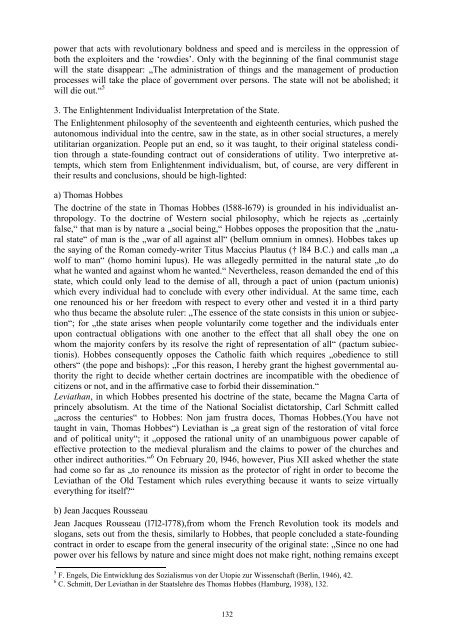Joseph Cardinal Höffner CHRISTIAN SOCIAL ... - Ordo Socialis
Joseph Cardinal Höffner CHRISTIAN SOCIAL ... - Ordo Socialis
Joseph Cardinal Höffner CHRISTIAN SOCIAL ... - Ordo Socialis
You also want an ePaper? Increase the reach of your titles
YUMPU automatically turns print PDFs into web optimized ePapers that Google loves.
power that acts with revolutionary boldness and speed and is merciless in the oppression of<br />
both the exploiters and the ‘rowdies’. Only with the beginning of the final communist stage<br />
will the state disappear: „The administration of things and the management of production<br />
processes will take the place of government over persons. The state will not be abolished; it<br />
will die out.“ 5<br />
3. The Enlightenment Individualist Interpretation of the State.<br />
The Enlightenment philosophy of the seventeenth and eighteenth centuries, which pushed the<br />
autonomous individual into the centre, saw in the state, as in other social structures, a merely<br />
utilitarian organization. People put an end, so it was taught, to their original stateless condition<br />
through a state-founding contract out of considerations of utility. Two interpretive attempts,<br />
which stem from Enlightenment individualism, but, of course, are very different in<br />
their results and conclusions, should be high-lighted:<br />
a) Thomas Hobbes<br />
The doctrine of the state in Thomas Hobbes (l588-l679) is grounded in his individualist anthropology.<br />
To the doctrine of Western social philosophy, which he rejects as „certainly<br />
false,“ that man is by nature a „social being,“ Hobbes opposes the proposition that the „natural<br />
state“ of man is the „war of all against all“ (bellum omnium in omnes). Hobbes takes up<br />
the saying of the Roman comedy-writer Titus Maccius Plautus († l84 B.C.) and calls man „a<br />
wolf to man“ (homo homini lupus). He was allegedly permitted in the natural state „to do<br />
what he wanted and against whom he wanted.“ Nevertheless, reason demanded the end of this<br />
state, which could only lead to the demise of all, through a pact of union (pactum unionis)<br />
which every individual had to conclude with every other individual. At the same time, each<br />
one renounced his or her freedom with respect to every other and vested it in a third party<br />
who thus became the absolute ruler: „The essence of the state consists in this union or subjection“;<br />
for „the state arises when people voluntarily come together and the individuals enter<br />
upon contractual obligations with one another to the effect that all shall obey the one on<br />
whom the majority confers by its resolve the right of representation of all“ (pactum subiectionis).<br />
Hobbes consequently opposes the Catholic faith which requires „obedience to still<br />
others“ (the pope and bishops): „For this reason, I hereby grant the highest governmental authority<br />
the right to decide whether certain doctrines are incompatible with the obedience of<br />
citizens or not, and in the affirmative case to forbid their dissemination.“<br />
Leviathan, in which Hobbes presented his doctrine of the state, became the Magna Carta of<br />
princely absolutism. At the time of the National <strong>Socialis</strong>t dictatorship, Carl Schmitt called<br />
„across the centuries“ to Hobbes: Non jam frustra doces, Thomas Hobbes.(You have not<br />
taught in vain, Thomas Hobbes“) Leviathan is „a great sign of the restoration of vital force<br />
and of political unity“; it „opposed the rational unity of an unambiguous power capable of<br />
effective protection to the medieval pluralism and the claims to power of the churches and<br />
other indirect authorities.“ 6 On February 20, l946, however, Pius XII asked whether the state<br />
had come so far as „to renounce its mission as the protector of right in order to become the<br />
Leviathan of the Old Testament which rules everything because it wants to seize virtually<br />
everything for itself?“<br />
b) Jean Jacques Rousseau<br />
Jean Jacques Rousseau (l7l2-l778),from whom the French Revolution took its models and<br />
slogans, sets out from the thesis, similarly to Hobbes, that people concluded a state-founding<br />
contract in order to escape from the general insecurity of the original state: „Since no one had<br />
power over his fellows by nature and since might does not make right, nothing remains except<br />
5 F. Engels, Die Entwicklung des Sozialismus von der Utopie zur Wissenschaft (Berlin, 1946), 42.<br />
6 C. Schmitt, Der Leviathan in der Staatslehre des Thomas Hobbes (Hamburg, 1938), 132.<br />
132















